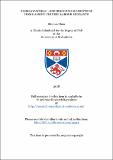Files in this item
'Homeawayness' : experiencing moments of home among Chinese labour migrants
Item metadata
| dc.contributor.advisor | Rapport, Nigel | |
| dc.contributor.advisor | Bunn, Stephanie | |
| dc.contributor.author | Chen, Shuhua | |
| dc.coverage.spatial | 300 p. | en_US |
| dc.date.accessioned | 2018-07-19T14:02:11Z | |
| dc.date.available | 2018-07-19T14:02:11Z | |
| dc.date.issued | 2018 | |
| dc.identifier.uri | https://hdl.handle.net/10023/15594 | |
| dc.description.abstract | Migration is a major feature of contemporary human life, while making home is ubiquitous. Being away from home creates a space for a migrant to rethink home and to make a home beyond something fixed, spatial, and material. This thesis concerns home and home making in the world of movement. It aims to investigate the ways in which labour migrants make home on their journey away from home, a home through which they express and fulfil themselves while making sense of the world. Based on fieldwork in the Chaoshan region in South China, I approach individual migrants from two practices of migration that have affected the region in the last 150 years: the historical international Nanyang (Southeast Asia) migration (1860s to 1970s) and the contemporary internal rural-urban migration (1980s to present). Specifically, my fieldwork includes participant observation through working in a toy factory with migrant workers and living together with them for a year, as well as some months of archival research of remittance family letters (qiaopi) in a local archive. To study these two different strands of Chinese migration is not aimed primarily at comparing or contrasting them; rather it is an attempt to explore the universal human capacity to make home in a variety of ways beyond socio-cultural or historical constraint. I argue that one experiences and makes sense of home in moments of being, while making home, making self (and vice versa) is a continual process. One is constantly in a process of self-negotiation, oscillating between identities that are being imposed and self- recognised, between one’s reality and one’s imagination, between one’s past and one’s future, and between one’s rootedness and one’s cosmopolitan openness. I conclude the thesis by proposing five keywords for studying home-in-movement: homeawayness, moments of being, interiority, cosmopolitan imagination, and walking knowledge. | en_US |
| dc.language.iso | en | en_US |
| dc.publisher | University of St Andrews | |
| dc.subject.lcc | HB2114.A3C5 | |
| dc.subject.lcsh | Migrant labor--China--Psychological aspects | en |
| dc.subject.lcsh | Home--Psychological aspects | en |
| dc.subject.lcsh | China--Emigration and immigration | en |
| dc.title | 'Homeawayness' : experiencing moments of home among Chinese labour migrants | en_US |
| dc.type | Thesis | en_US |
| dc.contributor.sponsor | Foundation for Urban and Regional Studies (FURS) | en_US |
| dc.contributor.sponsor | Centre for Cosmopolitan Studies | en_US |
| dc.contributor.sponsor | University of St Andrews | en_US |
| dc.contributor.sponsor | Saltire Foundation Fellowship Programme | en_US |
| dc.contributor.sponsor | Ladislav Holy Memorial Trust | en_US |
| dc.contributor.sponsor | Great Britain-China Educational Trust. | en_US |
| dc.type.qualificationlevel | Doctoral | en_US |
| dc.type.qualificationname | PhD Doctor of Philosophy | en_US |
| dc.publisher.institution | The University of St Andrews | en_US |
| dc.identifier.doi | https://doi.org/10.17630/10023-15594 |
This item appears in the following Collection(s)
Items in the St Andrews Research Repository are protected by copyright, with all rights reserved, unless otherwise indicated.

